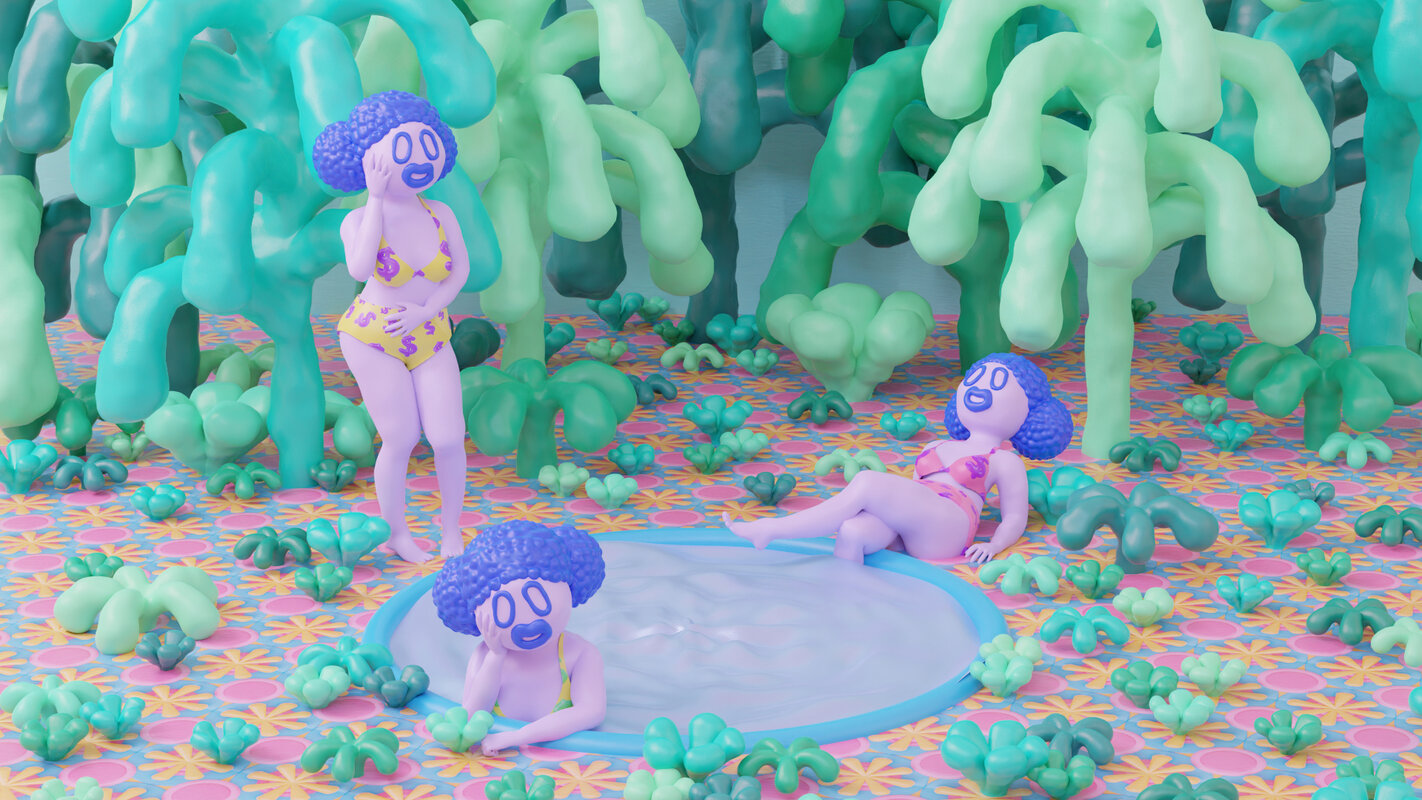
Loulou João: Welcome to the Focketverse
Loulou João is an Afro-Belgian 3D illustrator and animator. She uses 3D software (Blender) to visualize a digital world of candy-coated squishy objects, a safe space to express herself and reflect on struggles in the physical world. Viewing Blackness as a technology that constantly evolves to survive objectification and oppression, Loulou shines a unique light on the representation of Black women, and has attracted clients such as Adult Swim, Spotify, The New Yorker, The New York Times and MTV.
Pictoplasma: To introduce your work, who is Miss Focket and what is the Focketverse?
Loulou João: I have a digital alter-ego called Miss Focket, and through her and the Focketverse, I try to tackle some social stigmas with cuteness and sassiness. I’ve always existed within these predominantly white environments, feeling pushed into corners and stereotypical tropes that I don't feel comfortable with. The Focketverse came out of the necessity to truly express myself beyond this superficial layer of my identity, and show what it means to be a mixed Afro Belgian woman. I felt as though who I am was unheard and unseen, and I really wanted to discover my Blackness and womanhood, combined. During art school, the narrative was always, “Oh, you're such an activist, it's so aggressive. Do you see yourself as a representative for Black women?” I was pushed towards this aggressive, activist trope – which I think was mainly a reaction to my Blackness and people’s prejudices about that – but it was not how I experienced my work or myself at all. I just wanted to create this safe environment, and it didn't have to be physical – well, a digital space can also feel physical in a way – and for this digital environment, I needed an alter ego, a character that has a lot of aspects that reflect me but also still has this hollowness. That's why she has these hollow eyes, in relation to the other characters. She is aware that she doesn’t really exist within the digital sphere, but she exists in that sphere to explore herself and her identity and everything around it.
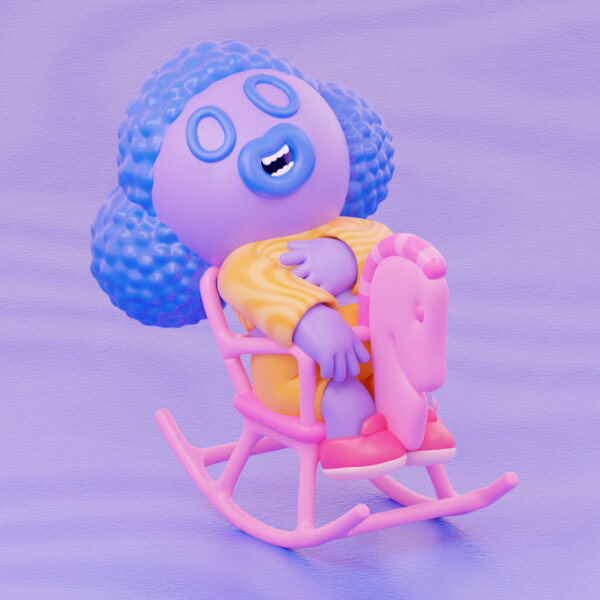
“Miss Focket is a strong, independent woman.”
Did you choose the digital realm as an escape? A place that did not have to be too realistic, and where you could make it as much your own as possible?
Here in Belgium, illustration follows very traditional styles, methods of working and techniques. It just didn't click for me. I didn't feel as though I could express myself by just drawing. Working with new technological processes feels so exciting. It still needs to be explored, and I feel as though I'm a pioneer, because the way that I use software is still pretty new. I strongly believe that you can have a more real and authentic sense of expression using new techniques, in ways that we can’t yet imagine. That's why I chose to go digital.
And how about your decision to make your digital world kind of sugary, with these soft colours and cute aesthetics? Why did you take that direction and not something more realistic or confrontational?
I feel that it's very easy when you're talking about mental health, depression or heavier subjects to also go to something like a black and white colour palette. With an overload of colours, you can express more of the chaos and craziness that's around you. It's a more layered look at the complexities of all the factors that are in the real world or in your hands, which are a lot to process. That's what I'm trying to put into my work. But at the same time, I'm trying to make it cute and visually pleasing so that at first, you're like, “Oh, this is so adorable!” But the longer you look at it, the more that you can see these different layers and how they work together.
“I'm trying to do world building.”
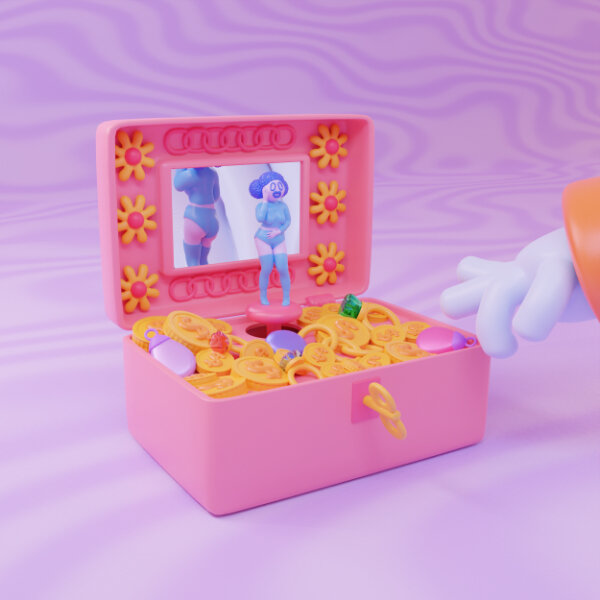
How did you then come up with your characters, mainly Miss Focket and Bébé Focket? How is your cast evolving?
I'm really trying to do world building, soft-world building, and so along the way, I'll try to add more depth into the universe. I started with Miss Focket. She's clearly my alter ego, and I'm exploring everything with her. Now Bébé Focket. My mom sent me some pictures of me when I was a child, and there was one where I'm around three years old, and I'm sleeping in sort of wooden rocking-horse contraption. I was thinking about my childhood and how it formed me. I had a lot of traumatic experiences during my childhood. I think that this ‘Bébé’ character is important, as she helps me to look at how early childhood and those experiences form you, like building blocks. When you're older, you still have to explore these factors all the time. With Miss Focket, even though she's insecure, she has enough self-belief to not ‘ask for a place at the table’ but make her own table and make spaces for other people to join her. So, she's a strong, independent woman but still vulnerable. Whereas Bébé Focket is not yet at that stage. She's a child and a little bit naive. She has a lot of hope and love and still believes in the unconditional beauty of the world. She’s this little ‘soft touch’ in the Focketverse, and I need her in order to occasionally show the harshness of the world that comes over a child like that.
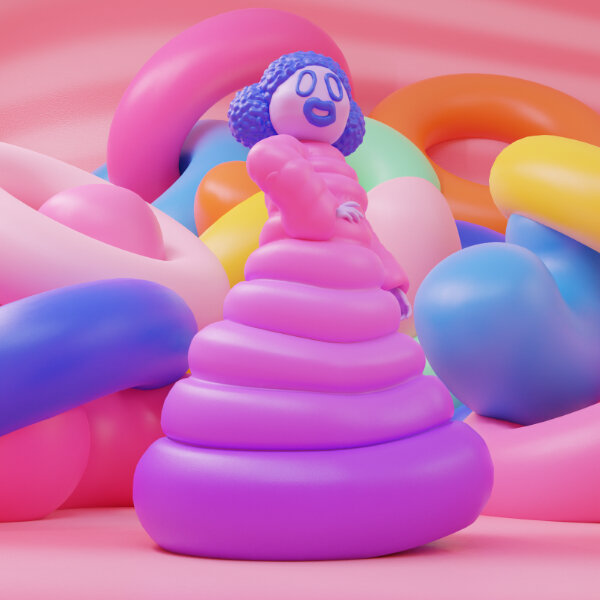
You have created a work in which Miss Focket is trapped in a music box. What does this work imply for you?
There have always been these classic music boxes with a little ballerina inside, and of course, it's a little skinny, blonde, white girl, which is the default image for all young kids to aspire to. Besides what the little ballerina looks like, if you watch a woman trapped in a box, twirling around to a little lullaby at other people's whims, the only purpose she serves is to be a voyeuristic object with no control at all. So that's what this piece tries to look at.
“Try to resist the constructions that are trying to control you.”
How would you describe the dynamic of our lives online?
Something happens to us when we’re behind the screen. There are these social boundaries
that get lost, boundaries that you can overcome and transcend. This doesn't really happen in a lot of contexts. Or maybe it's a little bit like losing your filters when you're drunk; you reveal a lot about who you really are. I felt the need to explore what those boundaries did to me, how growing up and still existing in a predominantly white environment has affected my identity as a mixed African woman.
Your work often has sexual connotations and plays with the limits of cuteness.
Cuteness can be a lot of things. It can be used in its most accessible sense of escaping, but it can also have a sense of madness, which is what I like. All my characters have a very feminine energy. They're all quite thicc, which I like, and they all have the same facial features. I have these stark facial features. And their hair, which is very important to me, could be braids or locks. All the features come from my own experience, they all belong to the African diaspora. Miss Focket is still analysing and searching for where she belongs, she is a bridge between the digital space but also within a physical reality show. She has these hollow, almost lifeless-feeling eyes, whereas the others have these puffy, puffy eyes.
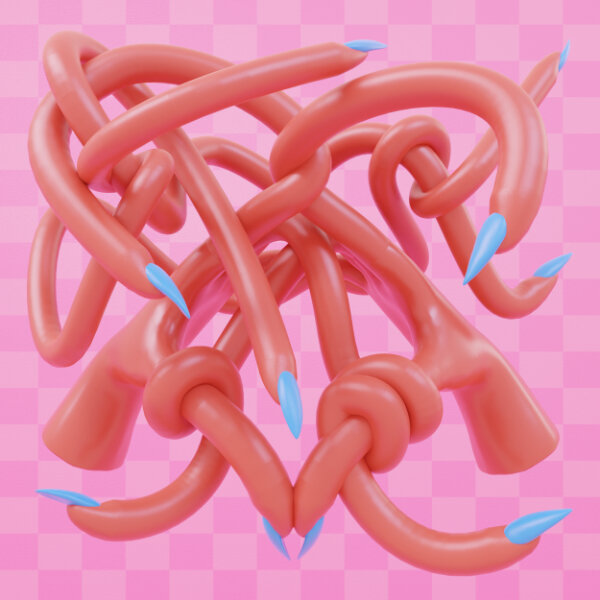
That sounds somehow dispirited, but your work has an energy that seems to be about embracing your corporeality and sexuality.
Yes, it's all about taking hold of your sexuality and being the sassy queen that you are, and just trying to resist the stupid people in the world and constructions that are trying to control you. I kind of hate the term ‘body positivity’. I feel that it has been hijacked and is taking such a toxic turn from the original intent. At the same time, we've been mostly living online during the pandemic and doing video calls and using face filters that change us, ever so slightly. I prefer the perspective of ‘body neutrality’ because body positivity still focuses on flaws but tells you that you have got to love them, even adore them, whereas body neutrality is, „I can still be a bad bitch, but you know, my body is what it is.“
You also started roller-skating recently and did some work based on that experience. Can you share what it means for you?
After lockdown in 2020, I needed a new thing because I wanted to work out. Everybody here in my city was jogging and walking, and that annoyed me so much. I really did not want to do that. And then, on Instagram and TikTok I found all these people roller-skating. It looked so cool. It was mostly people in California, so it had extra vibes, but I was really feeling it. Also, my partner Nathan is a skater boy and had been bugging me to start skating. I‘d only done inline skating as a teenager, but that’s very different. So, I said we can compromise. I joined a roller-skating girl-gang and took lessons with them at the skate park. It was just so cool! They have feminist, anti-fascist, anti-racist values, and they're all such strong women. At that time, I felt very insecure. I had gained some weight, but joining these people who said, “Oh, who cares? Wear booty skirts on your skates!” – that was just so empowering and very freeing. I had never spent a summer so much outdoors since I was a child, and that was truly amazing. I rediscovered how nice it is to meet up with people without going to a restaurant or doing all these ‘adult’ things. We’d just say, “Yeah, let's meet at the skate park and hang out there.” And then you just drop by a supermarket and pick up some baby carrots or something, you know?!
“Who cares? Wear booty skirts on your skates!”
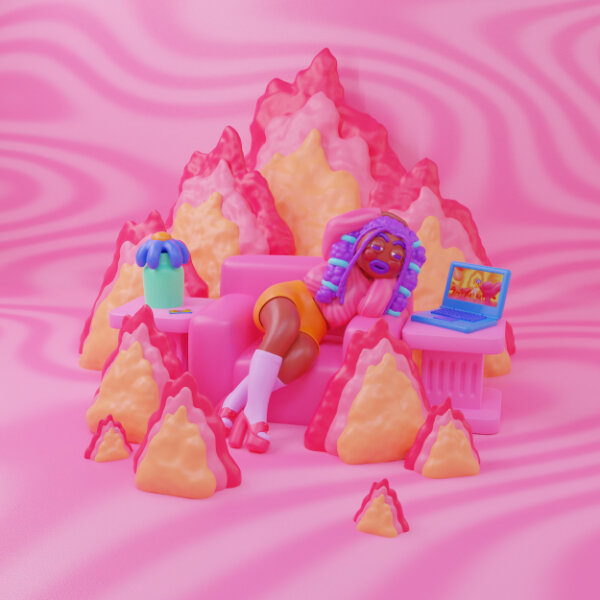
And now you're bringing that feeling back to the Focketverse!
Yes, and I am currently working on a project that is centred all around this experience. The only irony is that because I'm making that piece, I don't have the time to actually roller-skate! But yeah, I mean, that's part of the job.
Interview by Pictoplasma published in Pictoplasma Magazin – Issue 2: Character Care, 2022
- 215 views
- 0x empathy